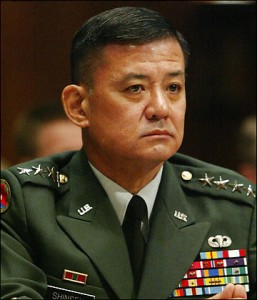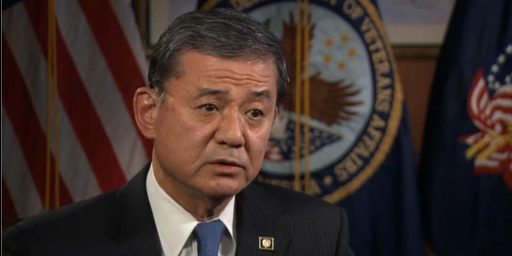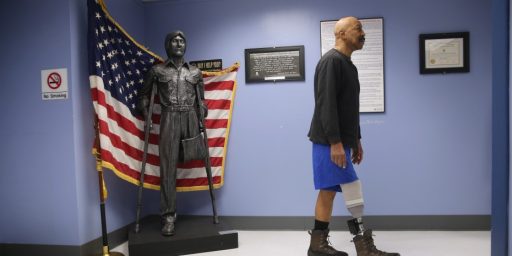Shinseki to Head Veterans Affairs
In a surprise move, General Eric Shinseki has been tapped as Barack Obama’s Secretary of Veterans Affairs.
Gen. Eric K. Shinseki disputed the administration's strategy of invading Iraq with a relatively small force. He retired shortly after Baghdad fell in 2003. (By Charles Dharapak -- Associated Press)
Shinseki, a four-star general and 38-year veteran who retired shortly after the fall of Baghdad in 2003, will appear with Obama in Chicago at a news conference today commemorating the 67th anniversary of the Japanese attacks on Pearl Harbor. Obama said Shinseki agreed to join the incoming administration because “both he and I share a reverence for those who serve.”
“When I reflect on the sacrifices that have been made by our veterans and I think about how so many veterans around the country are struggling even more than those who have not served — higher unemployment rates, higher homeless rates, higher substance-abuse rates, medical care that is inadequate — it breaks my heart, and I think that General Shinseki is exactly the right person who is going to be able to make sure that we honor our troops when they come home,” Obama told NBC News’ Tom Brokaw in a interview taped for broadcast today on “Meet the Press.”
[…]
Notably, Shinseki led the Army at the same time that Gen. James L. Jones, Obama’s pick for national security adviser, commanded the Marines. Both questioned Wolfowitz’s presumptions, before the war in Iraq commenced, about how the fighting would go, and they argued that the Pentagon was being too optimistic in its planning and should prepare thoroughly for worst-case scenarios.
[…]
Retired Army Gen. Colin L. Powell, who was President Bush’s secretary of state at the time of the Iraq invasion, called Shinseki “a superb choice. . . . He is a wounded hero who survived and worked his way to the top. He knows soldiers and knows what it takes to keep faith with the men and women who went forth to serve the nation. He also knows how to run large and complex bureaucratic institutions. His is an inspired selection.” Powell, also a former chairman of the Joint Chiefs of Staff, supported Obama’s election. Shinseki, 66, was twice awarded a Purple Heart for injuries sustained in Vietnam.
A truly inspired choice. While Max Cleland had been talked about for a second stint in the job and Tammy Duckworth was bandied about as a more unconventional choice, Shinseki will bring enormous clout to the post. Presumably, too, he wouldn’t have taken the gig without assurances that he’d be able to make a difference.
James Fallows notes that Shinseki’s quiet service continued into retirement: “Shinseki, who could have had a lucrative career on the talk show/lecture circuit giving ‘I told you so’ presentations, has not indulged that taste at all.”






A nice capsule of the general’s life and career–and his disagreement with Rumsfeld and Co.–is this wiki page. Here’s the nut:
.
I think this is his best appointment yet.
shinseki was wrong about troop levels and he wasn’t fired for arguing that they should have been 600,000-700,000.
facts here – in a link rich post.
read the truth if you dare.
So several hundred thousand equals 650,000 reliapundit? It’s a link rich, if not factually based post.
“Reliapundit” cites his own pathetic work and really is just a Bush dead-ender still defending how the war in Iraq was waged.
There is, though, an internal conflict in his logic. Shinseki said it would take more troops to pacify Iraq. Reliapundit, I’m sure, would claim “the surge” worked wonderfully. The surge, of course, involved an increase in the number of troops in Iraq.
Can’t have it both ways, Reliapundit.
But not to the levels advocated by Shinseki.
REMINDERS:
1 – I AM A REGISTERED DEM – HAVE BEEN SINCE 1974.
2 – I HAVE VOTED GOP A FEW, MAYBE THREE TIMES IN MYU LIFE.
2- I HAVE BEEN VERY CRITICAL OF BUSH ON MANY ISSUES INCLUDING THE IRAQ WAR AND THE POST-WAR – WHICH HE WAGED IN A HALF-ASSED MANNER.
3 – THE LINKS IN MY POST ARE ALL FROM OTHER SOURCES – INCLUDING LEFT-WING SOURCES LIKE THE HUFFINGTON POST.
BOTTOM-LINE: SHINSEKI WAS WRONG ABOUT TROOP LEVELS, HE WASN’T FIRED.
Yet another great pick by Obama, here is a General who wasn’t afraid to tell the truth and there weren’t many out there that had the guts to do that against Bush and the gang. He will do a good job in this position a man who really cares about and understands the troops needs.
The right may not like it, but Obama is putting together one hell of a good team
and he will show them all what a “real” President looks like.
I assume I will be shot down by the righteous right once this is posted, but do I care…not a jot!!
Poor caj seems to have some sort of paranoid persecution complex.
Posted by USAPatriot | December 7, 2008 | 03:03 pm
How is that exactly???
I’m impressed. Ten posts and not one attempts to perpetuate the fairy tale that Saint Eric was fired as Army COS for “talking truth to power.”
FWIW, not just a few believe that his SASC testimony in early ’03 was less an honest assessment of OIF force levels than an attempt to “gold brick” the Army out of the mission as directed by the NCA. Wars are bloody, costly and play havoc with future procurement budgets, you know.
Still a good pick for Veterans Affairs.
Even the republicrats and evangelicrats are now supportive of this great general, who stood up to be counted and for America…not like Powell and the other Bush/Cheney cronies. Another super addition to a team that will turn out to be the greatest administration that this country has ever had. And Lord knows that this is what our country needs. The “rats” now don’t even talk about the Pres Bush, who seems missing, but keeps harping on about Obama who has not even taken the oath as yet. I remember how talk radio kept referring to him as the “messiah” and their wishes will come true on 20th Jan. That is what this country needs now to lead our great nation out of this abyss.
“Even the republicrats and evangelicrats are now supportive of this great general, who stood up to be counted and for America.”
Shinseki did not fall on his sword “for America.” He contradicted the OSD in order to protect the institutional interests of the U.S. Army.
To put this in it’s proper context, don’t forget that both he and Sec of the Army White were “fired” (Shinseki was given early retirement) for insubordination in the case of the Crusader artillery program.
A good guy and an inspired choice for the VA, but the reality of his SASC testimony has been willfully distorted for partisan political purposes.